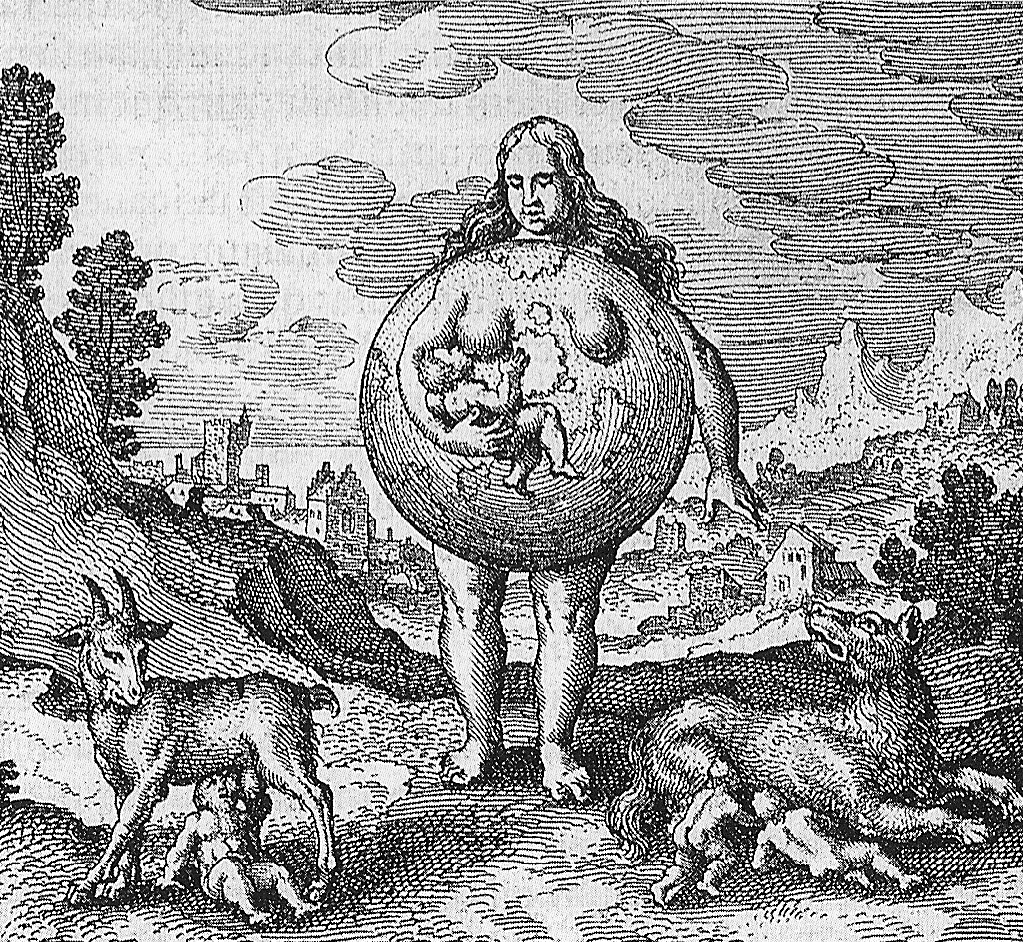
What is “the environment”? What is the nature of the word “environment”? And what, if anything, is the matter with it?
Most people seem certain they know what the environment is: its stuff out there. Why the worry? What is the genesis of these questions?
Few people disagree that it is vital to know what we are saying. So lets pause a few moments and reflect on what it is being said with these seeming randomly generated starter-questions. A few words stand out for me: “The”…”word”, “environment”… “I”… “nature”… “matter”… “genesis”… “question”.
The realization occurs that these few words together form the potential framework of a whole-world view. These seeming random, few questions seem to involve deep stuff. So how on Earth can we make good sense of the word “environment” amidst this profound, inextricably entangled labyrinth of meaning?
Perhaps it is helpful to start by first exploring the big picture of our use of the English language. After all, pictures can communicate truths of the human condition in ways that words never can. We will travel back a few millennia to the known genesis of the above English words with a particular focus on the evolution of the word “environment”.
For those unfamiliar with the other essays in this series, the journey involves mapping out the etymology of a word or phrase and then observing how changes in word meaning correlate with changes in human behaviour over time.
Mindful of the imperfect nature of our human condition, we travel with a great wise guide – the Conservation of Energy Principle. We can use its well-proven wisdom to both evaluate how sustainable our use of a word is and to help us transcend the limitations of the ego, thought and words.
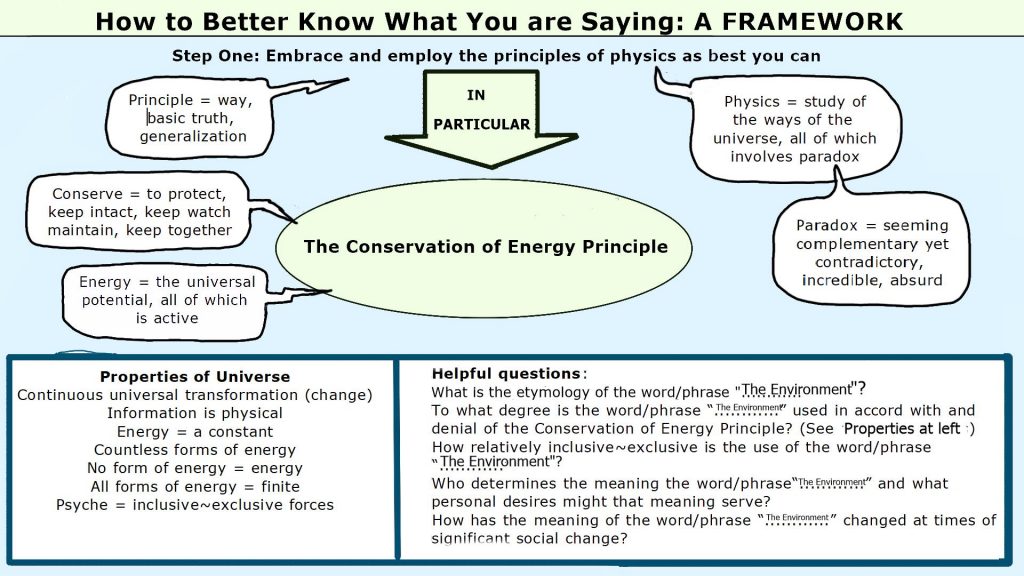
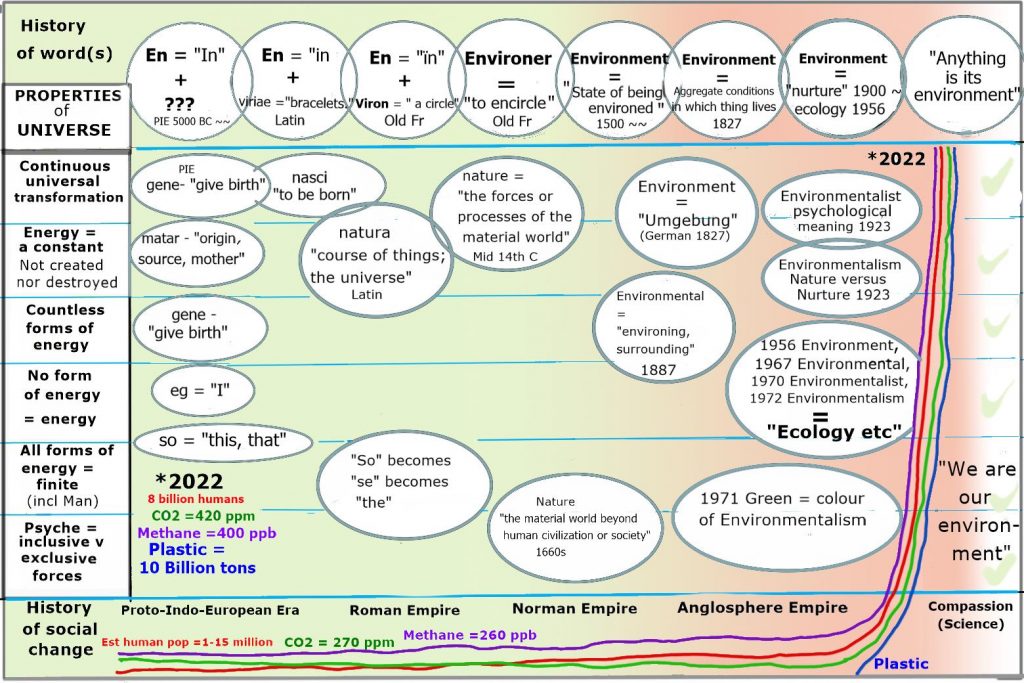
Some Proto- Indo-European (PIE) Wisdom
The first thing we notice as we peer through the mists of antiquity to Proto-Indo-European times is that PIE “en” means “in” as in enclose, embrace, envelop, inside, interior, into, herein, inhale, within, inclusive and thousands of other words describing the state of being enclosed or embraced.
Its really interesting to note how by the 16thC the meaning of the word “inclusive” had emerged with the meaning “characterized by including a great deal, leaving little out”. Such inclusiveness is a fundamental characteristic of the word “compassion” – “com” meaning “sharing”, “being together”, “at one”, “being connected”.
It seems that in the word “inclusive”, English language had a very valuable word over 400 years ago that beautifully summed up the nature of the force of compassion in the human psyche
The complementary word of “inclusive” is “exclusive” meaning “aside from”, “barring”, “outside of”, “restricting, “not counting”, “omitting”, “leaving most out” and, in general, being separate, alienated or apart from.
Such limiting activity is characteristic of the force of the ego in our psyche whereas the force of compassion is more associated with sensations of receptivity, unity and transcendence.
These two characteristics, “inclusiveness” and “exclusiveness”, provide us with the tools of language to discuss more meaningfully our modern exclusive notion of “environment”, especially the common concept of “the environment”.
Observe how the word “the” arises from Old English “se”, which in turn arises from PIE root “so”- “this, that”
(See https://www.etymonline.com/search?q=the )
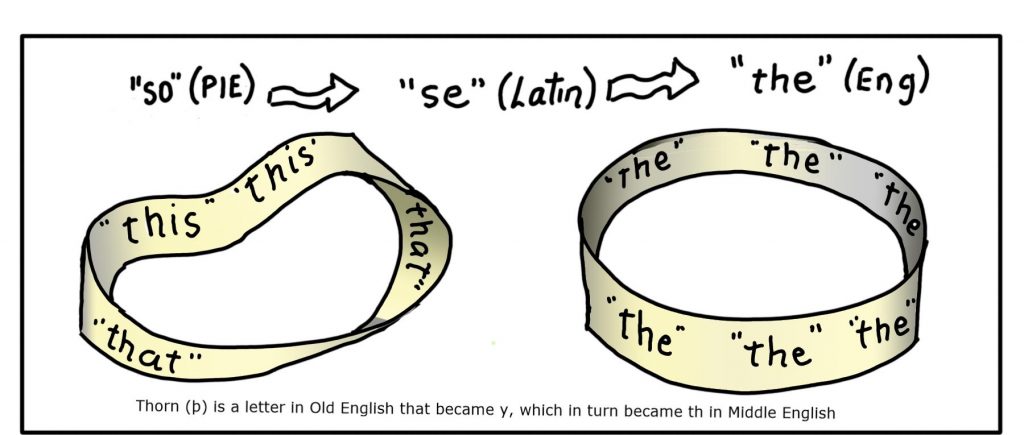
(See https://www.etymonline.com/search?q=the )
Could it be once upon a time that the original word “so” meaning both “this” and “that” inherently enabled us the transcend paradox? By comparison, our modern word “the” is very exclusive – “this” cannot be “that”.
Also one thing is certain – “the” is extremely exclusive compared to words like “a”, “an” and “are”, these words allowing for a multitude of other possibilities and more profound connections.
There is a world of difference between saying “Me/you and The Environment” and “We are our environment”.
While we are exploring word meanings in the era of Proto-Indo-European 2-5,000 years ago it is worth also noting another interesting cognitive linguistic phenomenon.
The words “nature”, “matter”, and “genesis” have a profound common factor:
“nature” arises from “nasci” – “to be born”, which arose from PIE “gene” – “beget, give birth”;
“matter” arises from PIE “matar” -“mother, origin, source”;
and “genesis” arises from PIE “gene” – “give birth, beget”.
The PIE language is rich in reminders that our personal experience of existence involves procreating (bringing forth) and nurturing (nursing, suckling, nourishing, caring for).

Aion floor tile mosaic c400AD
Glyptothek Munich W504.jpg
As we travel towards the 14th C, we can observe a paradoxical phenomenon seems to occur: the meaning of “nature”, “matter”, and “genesis” become more generic, involving universal existence, the total universe, entire creation. Their meaning becomes depersonalized.
So, for instance, according to etymonline.com, “nature” comes to mean “the forces or processes of the material world; that which produces living things and maintains order” while material comes to mean “component substance, matter from which a thing is made,” and “made of matter, having material existence; material, physical, substantial.”
At first glance it seems the language is reminding us in the inclusive qualities and acts of compassion. We are being reminded we are all elements of the continuous, universal transformation, our actions informing and begetting all even as we are informed by all. In other words, we are mortal, moral beings of the universal flux.
However deeper reflection reveal that even as meaning of “nature”, “matter”, and “genesis” becomes more general or generic, their meaning also becomes more exclusive, less inclusive of the personal experience of existence.
For instance, even the word “general” comes to mean “a general” – a high status commander in the military hierarchy.
More recently, our modern Scientific notion of the “gene” has us believe we are born informed with immutable DNA information residing in our cells
Meanwhile “nature” comes to mean “material”, which in turn has become divorced from its previous PIE association with the human spirit and our capacity for procreating and caring.
Soon Descartes will proclaim the dichotomy of mind and body, as in “cogito, ergo sum” (“I think, therefore I am” ) giving rise to our modern English medical dichotomy of brain and body with all the debates about “nature versus nurture”, “eugenics”, the “genetic engineering” of behaviour etc.
Such alienation, division and conflict seems more typical of the ingenious, self-centred machinations of the ego than the more inclusive, generous qualities of compassion.
The English word “chemistry” arises from “alchemy”. It is arguable Chemistry is the practice of “alchemy” stripped of its associations with spirituality. It is interesting to compare this image of existence with Loutherbourg’s painting of “Coalbrookdale by Night” – a hellish vision of the Madeley Wood (or Bedlam) Furnaces, the legendary home of the English Combustion Revolution (AKA “the English Industrial Revolution”)
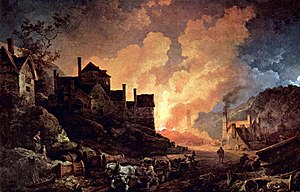
So What’s with “The Environment” and “Environmentalism?”
Let us first start with the word “environ” and quote from my trusted assistant
https://www.etymonline.com/search?q=environ
environ (v.)
late 14c. (implied in environing), “to surround, encircle, encompass,” from Old French environer “to surround, enclose, encircle,” from environ “round about,” from en- “in” (see en- (1)) + viron “a circle, circuit,” also used as an adverb, from virer “to turn” (see veer). “
Observe how “environ” is a limiting or confining action such as performing a military siege of an enemy or corralling a flock of sheep in a pen so they are in a state of containment, confinement, imprisonment, restraint or environment.
The implicit meaning is that we are performing the action. We are surrounding and confining something. We are causing the environment of something to occur.
How does this make sense in modern English?
How did we end up inverting the situation and believing we are the encircled or imprisoned?
How did we end up with Crown Ministers, Secretaries, Under Secretaries, Permanent Secretaries and other Government Officials advocating “for The Environment”?
Is this nonsense and a sign of our insanity? Have we environed ourselves in our minds?

Let us explore the events of the past two centuries before delving into the psychology~physics of our situation. The cartoon graph of changes in human behaviour and language over time clearly indicates a very radical change has occurred during this recent period.
What happened? What enabled a minority of human beings to form a global oligarchy sustained by the insane belief that the potent mineral biomass of the planet exists for them to burn at their will, which they do on an an unprecedented scale. This insanity is reflected in the fact that those governing the Anglosphere insist on calling mineral biomass both “Fossil Fuel” and “Energy”.
This ethos of wilful combustion also enables such a vast, wasteful industry of plastics and soil fertilizers that these activities too are poisoning and destroying the vital flows and balances of the planet that sustain human beings.
This is reflected in the evolving, twisting landscape of our English language. Prior to the English Combustion Revolution (aka the English Industrial Revolution) we see our notion of “nature” being depersonalized and nature being associated with “the forces or processes of the material world; that which produces living things and maintains order.” i.e. stuff happening “out there”.
“Nature” still retains some personalized meaning in that it now is refers to our “hereditary circumstance; essential qualities, inherent constitution, innate disposition”. However nature is increasingly defined as the “original undomesticated condition”, a state separate to the human state.
Similarly “material” has lost its associations with “mother” and “maternity.” “Materia” came to mean “matter, stuff, wood, timber” in Latin and by mid-14c. “material” meant, “real, ordinary; earthly, drawn from the material world” (contrasted with spiritual, mental, supernatural) See https://www.etymonline.com/search?q=material
By the early 19th century the English Empire is expanding mightily because of its inordinate use of firepower. This is manifest in its unparalleled fleet of coal-powered warships and trains, the lethal nature of its armaments, its coal-powered manufacturing systems and its combustion of vast forests around the planet.
This is the time when the Crown (the City of London merchant bankers) not only deemed mineral biomass to be “fossil fuel”. They also deemed its combustion to be a “resource”. This is a typical manifestation of extreme psychopathic behaviour and the complete denial of the principles of physics.
About this time the Crown dialect of English also adopted the word “environment” with the meaning “the aggregate of the conditions in which a person or thing lives” – this being Thomas Carlyle’s interpretation of the German “Umgebung”.
All these radical change in meaning of key words in the English language is indicative of the adoption of severely psychopathic behaviour.
Please note re “Umgebung” : German language is a foreign language to me though I am aware many German words lose much of their meaning when translated into English because of cultural differences.
Also please be aware that these essays are not an expression of hatred of all things English. It just so happens English, the Crown dialect of English in particular, is my mother tongue, and my system of analysis can be applied by anyone to their mother tongue, native language, lengua materna, Muttersprache or whatever language you were born into. It so happens that the analysis according to psychology~physics indicates this modern dialect of English is extremely unsustainable, even lethal.
Paradox of Early “Environmentalism”
(Are We Gene Made or Are We Born a Blank Slate?)
Many people assume “Environmentalism”, things “environmental” and “Environmentalists” have been with us since time immemorial. They are often surprised to learn that actually these words are very recent inventions. I was.
Certainly, individuals and cultures around the planet have developed sophisticated, holistic Civic systems that have conserved and sustained the soils, waters, air and the life of the prairies, forests and oceans for many generations to come. Many sustainable people did this with no sense of being “Conservationists”* or “Environmentalists” or of being part of a political movement. Their sentience was such that they lived lifestyles in considerable harmony with the ways of the universe, just as their ancestors did. This is how and why they did not burn all the biomass of the planet and poison the airs and waters globally, as they could have.
It is probable that deeper analysis will indicate their relative sustainability and harmony is reflected in their mother language being more in accord with the Conservation of Energy Principle.
Note* The question “What is a True Conservative?” merits an essay in its own right.
We have seen how the word “environ” arose as a verb in the 14th Century and its meaning in English soon inverted and depersonalized. Originally it involved the act of surrounding or enclosing stuff “in there”. However then it came to mean the stuff “out there”.
These two different meanings generate entirely different world views: one involving our personal actions and decisions and the other involving the processes of the rest of the universe apart from us.
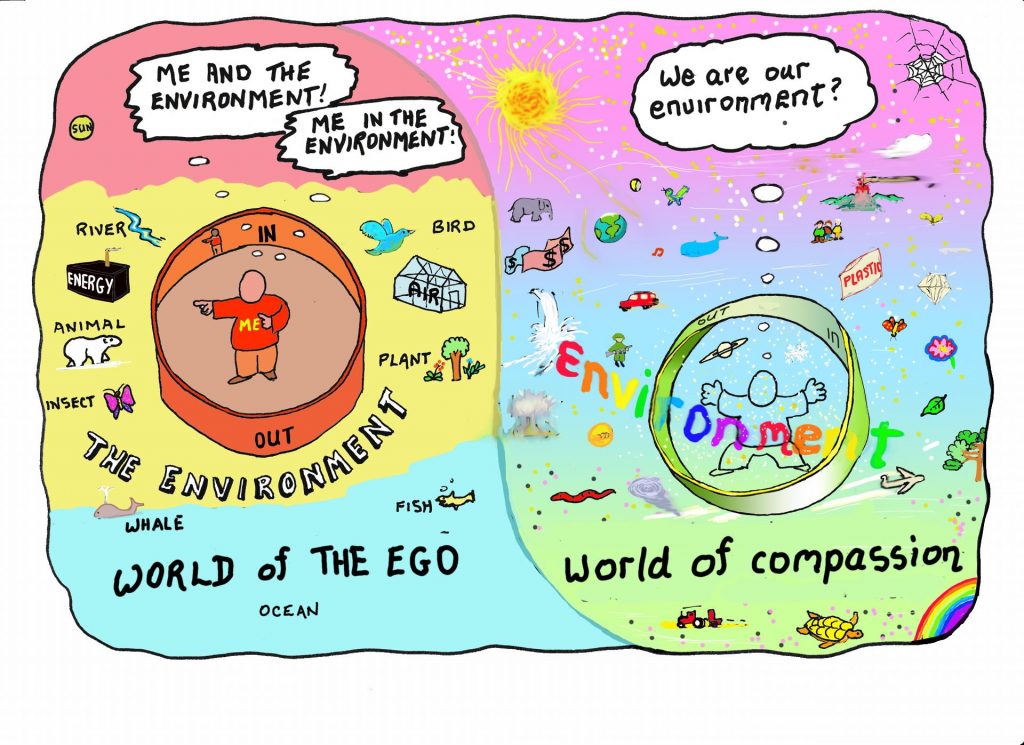
This change is consistent with the advent of Cartesian psychology (mind-body separation), Newtonian physics (mind -universe separation) and the dualism of European medical theory.
Men (human beings) have probably wondered about the question of “Nature v Nurture” since the earliest moments of self-awareness. The English Romantic Poets certainly tangled with it as part of their reactionary response the extreme despoliation and pollution in the early years of the English Combustion Revolution.
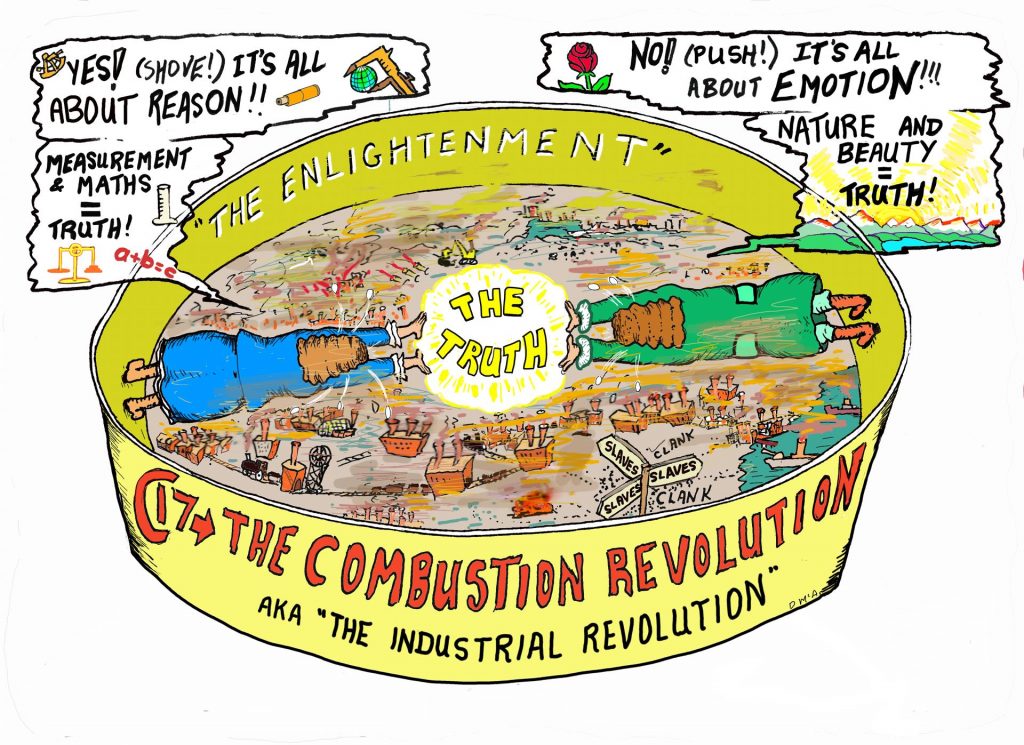
The scene is 18th C England. One group – the Rationalists – push their belief we can think our way to the truth and solve our problems.
Another group – the Romantics – shove back with their belief that our emotions provide the solutions to our woes.
Together they form a force sustaining and worsening the pollution and misery caused by the English Combustion Revolution.
“Nature v Nurture” became a subject of intense debate in the Anglosphere and Europe in the early 20th Century as the City of London Corporation merchant bankers enthusiastically embraced the competitive elements and excluded the cooperative elements of Darwinian evolutionary theory in in order to justify their extreme psychopathic “survival-of-the- fittest”,”red-tooth-and-claw” “ruthless jungle” notions of “Capitalism”.
This intensified the dualism of the debate of whether we are “products of our genes” or “products of our learned behaviour” and the “Mind-Body” division became more the “Brain-Body” division.
I will not detail the convoluted, inwards spiraling academic and intellectual shenanigans of this extreme dualism in the 20th Century except to say:
(a) such self-centred behaviour is typical of ingenious self-trickery and devilry of the ego;
(b) there is a revealing Anglo-overview of the debate at https://en.wikipedia.org/wiki/Nature_versus_nurture
(c) the words “nature” and “nurture” have both been depersonalized;
(d) the words “environmentalism” and “environmentalist” arose in 1923 out of Psychology, not Ecology.
The further devilment of the word “environment” did not arise until half a century later. Until then, “environmentalism” described Psychological theories promoting “behaviourism” and from 1916 an “environmentalist” was a person who “holds the view that environment, rather than heredity or culture, is the primary factor in the development of an individual or group” (https://en.wiktionary.org/wiki/environmentalist).
So was an “Environmentalist” a nature or a nurture proponent? Do we environ or are we environed? Do our genes determine our culture? And the confusion is getting worse if we are to believe this Scientific American headline:
In the Nature–Nurture War, Nature Wins
https://blogs.scientificamerican.com/observations/in-the-nature-nurture-war-nature-wins/
“Environmental influences are important, too, but they are largely unsystematic, unstable and idiosyncratic
Are you conflicted, confused and dispirited to hell by all this and what does it say about the level of compassion and sanity of our Anglosphere culture?
If you are not familiar with the cognitive linguistic analysis of this series of essays, please hang in through the next epic state of confusion of the meaning of the word “environment” and remain mindful the series is primarily about enjoying true hope of physics.
The Madness of Modern “Environmentalism”
(When Well-Meaning is not True Meaning)
“The War to End All Wars” (1914-1918) turned out to be just the prelude to horrific “Second World War” (1935 -1950), which in turn was just the prelude to a suicidal, global war on Earth’s capacity to sustain humankind.
The Anglosphere Empire became even greater after WW11. Certainly the center of power of the City of London-Washington DC Axis had moved towards the latter though the City of London Corporation still remains to this day the dominant financial center on the planet. However now in the early 1950s the Anglosphere oligarchy had an unprecedented capacity to control the global affairs of human kind, largely because of its ability to control and use global supplies of mineral oil~gas. Its military-industrial complex had the capacity to enforce the Crown dialect of English as the prime global language of commerce and the US dollar as the global reserve currency
The Anglosphere oligarchy consists mainly of White, extremely rich males with very unsustainable lifestyles. The extreme psychopathy of their ways is manifest in their use of the Crown dialect of English, a dialect typified by the conflation, exclusion, inversion, dehumanization and redefinition of the meaning of many key English words with one objective in mind: their maximal gain of personal short-term profits.
Exemplars of this mutation of meaning of the English language include the following:
- the word “energy” is conflated with “forms of energy”, as in the following fatally flawed equation “Energy = Fossil Fuel = Power = Electricity = Bulk-generated electrical products“;
- the meaning of the word “economy” is inverted to mean a system of planned obsolescence and deliberate waste while notions of “economic health” and “GNP” omit any consideration whether an action is immoral and might be profoundly destructive.
- the revised meaning of a “resource” such as a “fossil fuel” excludes any consideration of whether it can be recycled or whether its combustion impacts climate balances;
- the exclusive use of words like “share”, “capital”, “equity”, “resource” and “commodity” demean them of any association with compassion, justice and the principles of physics;
- the description of human beings as “capital”, “resources” and “commodities” is dehumanizing.
Those familiar with this series of essays may be noting a common theme in this mutation of the English language: these exemplars all express major exclusivity and profound denial of the Conservation of Energy principle, this being typical of the occurrence of ego-driven behaviour in the absence of sufficient compassion.
Mention of compassion reminds us that, without our experience of compassion, the ego can easily make any of us our own worst enemy. So it was with the likes of English Romantic Poets such as Samuel Taylor Coleridge and Wordsworth, who reacted with great passion against what they perceived to be the immoral ethos underpinning the waste, pollution and slavery endemic in The English Combustion Revolution.
Unfortunately their well-intentioned reactionary response generated on an unimaginable scale the unsustainable notions of Philosophy, Science and Art that frame our world today and inform the escalating Anthropocene.
Seeds of War, Silent Spring, Silent Change
Fast forward till the mid-late 1950s and the seeds of the military petro-chemical industries are propagating deep in the long shadow of WW11. People like Rachael Carson are observing their insidious impact on life. She publishes “Silent Spring” in 1962 and within a year a copy of the book is somehow in the hands of this impressionable 14 year-old youth living on a remote forested sheep station on the shores of Lake Wairarapa in faraway New Zealand.
Initially I imagined this dystopian world was somewhere far out there way across the oceans until I began noticing skull and cross bones and other danger signs on some of the drums of chemicals stored in the farm sheds. This was a shocking, life-changing realization for me. I had never thought to notice, let alone question them. Suddenly the reality of the hideous eco-politics of our Military- Industrial- Petro-chemical Complex hit home to me. Henceforth I felt myself to be a unquestioning, motivated member of the global Green Movement for the next half century, whatever political party or religion I aligned with.
My sympathies are with the modern “environmentalists” in the 1950s, just as they are with the Romantic Poets in the early 1800s when they first confronted the emerging hellish world of the English Combustion Revolution with all its slavery, pollution and genocide. Its difficult not to respond in reactionary ways and compound our dangerous situation.
I was stunned a decade or so ago, as maybe you are now, to discover the word “environment” was only given its meaning of “ecology” as recently as 1956. I was already nearly a decade of age then. And I was already an adult in the 1970s when the words “environmentalist” and “Environmentalism” lost their psychological meaning and gained their exclusive ecological meaning while green became the chosen colour of environmentalists.
I, like many people, just assumed this exclusive meaning was the natural order and had been round forever. Unbelievable. It seems this radical change in meaning had occurred unseen right under my nose, or to be more precise, it had occurred unnoticed right on the tip of my tongue.
So what had happened?
We see the same reactionary phenomenon occurring in the the 1950s as had occurred with the Romantic Poets. This time Ecologists, people who study how living things interact with their dwelling places, became very alarmed as they witnessed the destruction of these exquisite, complex interconnected life-enabling systems. So they established a reactionary force, a movement against “The Military-Industrial-Chemical Complex”. This we know as “The Environmental Movement”.
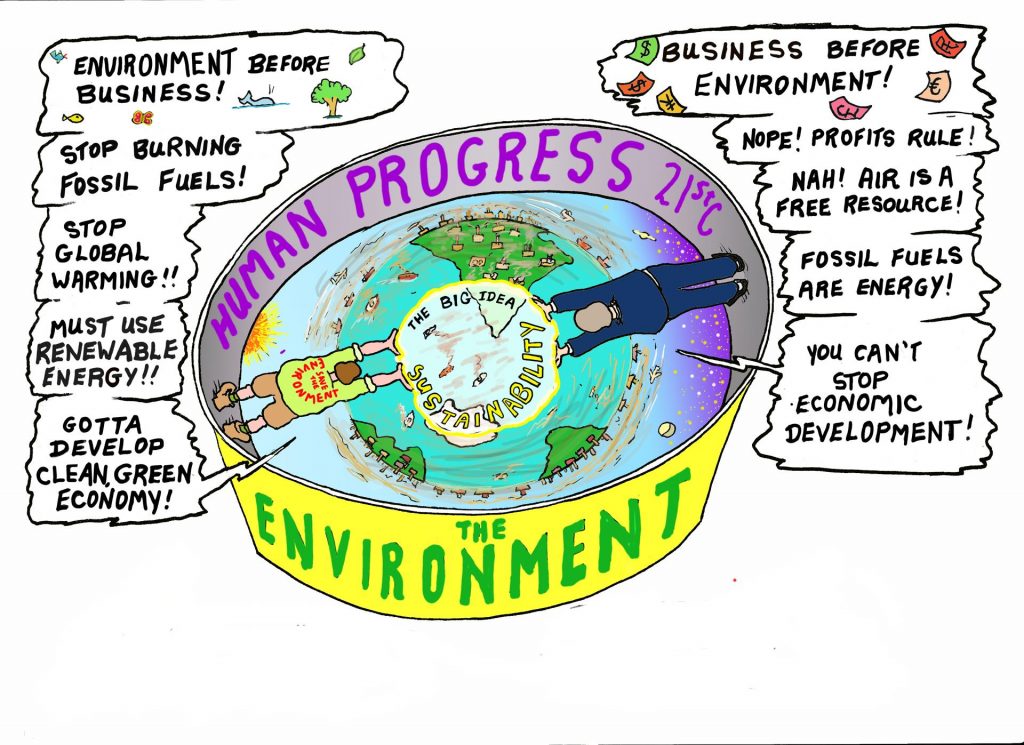
Together they form a formidable force propagating The Crown Dialect of English and its associated Anthropocene.
Each of us exists as a balance of the forces of the ego and compassion. The above cartoons depicting our human tendency to interact in reactionary ways apply to us both as societies and as individuals. Each of us engages in private discussions with ourselves in accord with our mother-tongue all the time. For instance, do I buy local or imported food? Do I car, walk or train? Do I or do I not kill this fly?
There is little doubt that many of these Ecologists were incredibly dedicated, passionate and well-meaning in their cause. However the principles of physics prevail regardless of the ingenious denials and deceits of the ego in each of us. Perhaps many of these good folk failed to realize that we all fail in our finest endeavours if our lifestyle and language are not in accord with the ways of the universe.
Many of the most influential Ecologists-come-Environmentalists failed to evaluate the sustainability of their lifestyles using the wisdom of the Conservation of Energy Principle. Instead they measured their lifestyles against the profligate lifestyles their ego-driven merchant foes.
We are our language and, in their reaction, they also adopted the Crown dialect of English language enabling the The Military-Industrial-Chemical Complex and the Combustion Revolution in general.
Thus it has come to be common practice for the literature, placards, audio, video and other media of the Environmental Movement (aka “The Global Green Movement”) to urge us all to “Stop Burning Fossil Fuels”, “Kill Carbon”, “Save/Conserve Energy”, “Use Renewable/Alternative Energy”, “De-Power our Lives”, “Stop Global Warming”, “Say No to Climate Change”, “Act for The Environment”, “Transition to a Post-Carbon World” and “Save The Planet” if we are to avoid self-extinction.
Such exhortations have three common threads:
- they are all non-science i.e complete nonsense in terms of the principles of physics;
- – they actually propagate the language of the psychopathic merchant bankers who most profit in mercenary ways from the dangerous waste and pollution.
- Very often these well-intentioned Environmentalists specialize in teaching, journalism and designing legislation where, for lack of compassion, their finest motives become their own worst enemy. They design and promote institutions such as the “Ministry for Energy and Resources”, “The Ministry for The Environment”, the “Energy Efficiency and Conservation Authority”, “The Green Party”, “Greenpeace”, “The Zero Carbon Act”, “The Clean Energy Corps”, “The Climate Change Commission”, “The Environmental Defense Fund” ,“The Department of Energy” and “The Environmental Protection Bureau”.
They have created a labyrinth of great confusion. Are we in or out or neither or both? Are we for or against or with or what? Is the universe a threat to us or do we have to save it from itself? Who protects what from who and why?
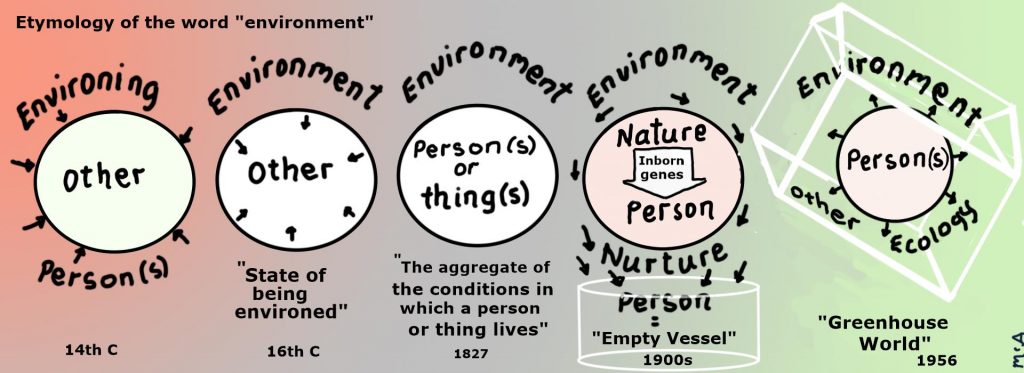
Enjoying True Hope of Physics
(We are our environment; our environment is us)
All men (human beings) who enjoy a healthy balance of compassion with the ego can transcend the human condition and live in harmony with the principles of physics. One does not have to be very clever or to have a top-notch university degree to attain this harmonious state of being. Indeed, some of the most clever and articulate people on the planet are quite incapable of living in accord with the wisdom of physics though they may be able to calculate with great accuracy intricate mathematical equations and know all manner of facts about the principles of energy.
Compassion uniquely counterbalances the ingenious self-deceits, obscuration and arrogance of the ego. So enabled, we can better experience oneness with all and employ the great, simple insights of the principles of physics in our daily lives.
A wonderful example is the way the inclusive, connective spirit of compassion enables us to more fully experience the reality of Conservation of Energy Principle – the universal potential, all of which is active, always transforming all.
We enjoy humility in compassion, reminded in acceptance of our mortal, moral state and so we opened to the ways of the universe so its sustaining potential is more manifest in our life. We are better able to truly embrace our roles as stewards amidst the universal flux of energy.
In other words, compassion liberates us from the fears, delusions and acquisitiveness of the ego. It releases us from the need to maintain our grandiose, demanding visions; our sensations of our self-importance; our ego-derived pantheon of false foes; and our general belief that we have to save the universe from itself.
The planet does not need us to rescue it for it is sustained by forces far beyond the powers of our imagination.
Energy does not need conserving or saving because energy is always conserved and humans can only conserve some forms of energy. Energy is resource.
We need not demonize, fight and ban carbon because carbon is a fundamental building blocks of every living cell on the planet – we need only accord its true value and conserve the earthly flows and balances that sustain humankind amidst the universal carbon flux.
We need not struggle with and resist either global warming or climate change for they enable life in accord with the universal principles of thermodynamics – we need only focus on endeavouring to ensure our actions are in accord with the thermodynamics of the air, oceans and soils that constitute us.
With compassion, the spirit of science is liberated in each of us, enabling Civics to flourish and the sustaining universal potential to be better manifest in us so that we enjoy oneness with all. We become our environment in language, deed and reality.
Ist draft complete 23 April 2023.
Other essays in this series:
Medium part 1 Tongue-tied by the English Language
(On untying the bonds of the mother tongue)
Medium part 2 What’s in a Word?
Medium part 3 What is Energy?
Medium part 4 What is Power?
Medium part 5 What is Economy?
Medium part 6 What is Warming- Up?
Medium part 7 What is a Fossil Fuel?
Medium part 8 What is a Resource?

